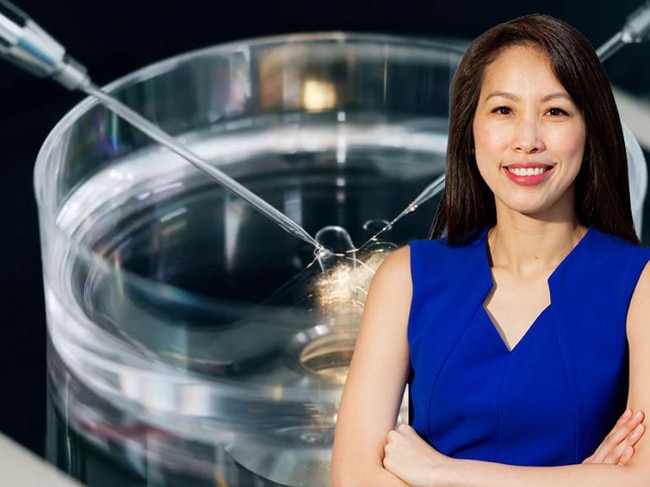Egg freezing: The 7 things you should do before you start fertility treatment
If you’re thinking about freezing your eggs you should start preparing at least three months before. Top fertility specialist Dr Cheryl Phua lists seven things to do.
Fertility
Don't miss out on the headlines from Fertility. Followed categories will be added to My News.
Many patients are surprised that the number of eggs they obtain may not always be easy to predict.
Not every follicle contains an egg and not every egg collected is suitable for freezing.
If you’re thinking about freezing your eggs you may feel overwhelmed about where to start. Ideally, if you have time, it should begin three months before treatment through some simple changes to your lifestyle.
You can also find out more about your fertility time frame with your GP through a blood test and a scan.
Here’s a list of seven things you can talk to your GP and specialist about ahead of freezing your eggs.
Do an AMH test (also known as egg timer test)
This is a blood test that your GP or fertility specialist will order.
There’s no need to fast before it and you can do it any time in your menstrual cycle.
It measures something called the anti-müllerian hormone which is secreted by granulose cells within the ovaries.
This gives you an idea of where you stand in terms of the total pool of eggs that remain.
It has nothing to do with egg quality or chances of falling pregnant, but it just gives you an idea of whether you have an average, low or high reserve of eggs left, and may help guide your decision making regarding the next steps.

Get an ultrasound scan
You do an ultrasound before you begin egg freezing – either ordered by your GP or fertility specialist.
It’s preferred to do it earlier in the menstrual cycle, around day five after your period.
The scan is done to check the ovaries have no cysts or abnormalities lining the womb like undiagnosed polyps or fibroids.
The scan also shows the number of follicles in both ovaries.
These are little pockets of fluid which can potentially contain an egg – which can be a helpful adjunct to your AMH level.
Check if you have a vitamin D deficiency
Low vitamin D – which you get mainly from the sun – is linked to poorer outcomes with people trying to fall pregnant.
It’s quite common among office workers because they’re inside so much during the day.
I usually advise women to have their levels checked and if it’s low, to start a vitamin D supplement.

Talk to your specialist about supplements
These are what we call add-on treatments (or adjuvants) for egg freezing but it is crucial you speak to your specialist before starting to take any supplements.
There are very small studies that suggest a potential benefit from taking them but we are also not sure if there is any harm.
Some you can inquire about include Coq10 or Ubiquinol (which is the active form of Coq10). NAC is another supplement that a lot of naturopaths would advise and NMN appears to have a lot of potential.
Melatonin and DHEA may also benefit women who are older, have low egg counts or poor responses to previous IVF treatments.
It is really important to discuss the pros and cons of each with your healthcare provider.
Exercise regularly – but not too much – and eat a Mediterranean diet
Regular exercise is important before undergoing egg freezing treatment.
Studies have also shown that the Mediterranean diet is also useful in helping fertility due in part to the high antioxidants.
That means various vegetables, olive oil, beans and fish with a bit of meat and cheese.
It’s best to start these lifestyle changes a minimum three months before treatment if you’re able to.
Cut down on coffee, avoid alcohol and quit smoking or vaping
One coffee a day is what you should be limiting yourself to before and during the egg freeze process.
You should also try to cut out or limit alcohol in the three months before you begin injections. And if you smoke or vape it’s best to stop because the evidence suggests poorer outcomes in falling pregnant and also during IVF.

Check for endometriosis if you have symptoms
There are a very high number of women who have undiagnosed endometriosis – on average it can take up to six years to diagnose because there is a tendency to just treat the symptoms rather than looking for a cause.
Having endometriosis can impact your fertility journey and treatment. Depending on your case, you could also be eligible for a rebate.
Dr Cheryl Phua is a distinguished specialist offering personalised fertility and gynaecological care with IVF Australia in Sydney. She is also among the 5 per cent of gynaecologists and obstetricians with a subspecialty in reproductive endocrinology, which focuses on hormone health, fertility assessments and therapeutic options.
You can follow her on Instagram at @drcherylphua or ivf_australia.
Originally published as Egg freezing: The 7 things you should do before you start fertility treatment


